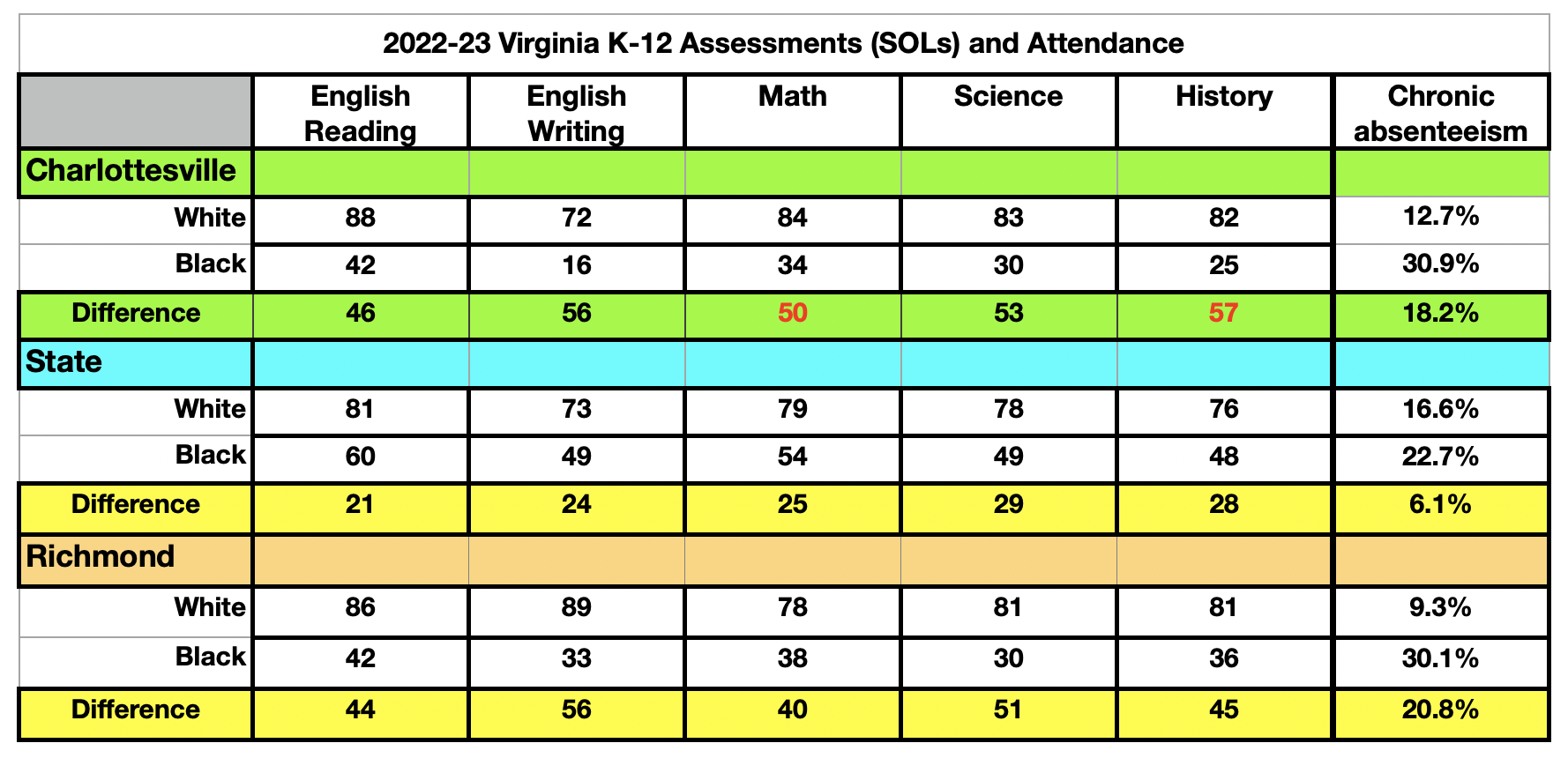by James C. Sherlock

Readers opine that I am throwing ideas into institutional quicksand when advocating for education reforms. But I hope not.
For example, in my most recent series I have suggested that Virginia’s Standards of Learning (SOL) process needs fundamental reform with the integration of learning and teaching standards.
Critics have written with varying levels of insistence that teachers do not like being told how to teach. That horse has been out of the barn for a very long time.
That is perhaps one reason why so many of them are leaving.
The system of which they are part does little else but tell them:
- what to teach;
- how to teach;
- what they can and cannot say about what they teach; and
- even how to feel about all of that.
And God help parents or teachers that disapprove.
VDOE claims, in the case of its new math SOL, to take input from:
parents, teachers, the business community, school administrators, representatives from higher education and state mathematics education organizations.
That is boilerplate.
Does anybody know a parent or a business that made an input? Or whose input was accepted? The NEA itself complains that teachers have little voice.
Education is a closed government-industry system that literally cannot imagine being better than it is. The words “closed” and “government” in that context are redundant.
To understand how it is so closed we need to examine it.
The “blob.” The Center for Education Reform has christened the American education system a “blob.”
The term ‘Blob’ cropped up years ago when reformers began trying to work with the education establishment and ran smack into the more than 200 groups, associations, federations, alliances, departments, offices, administrations, councils, boards, commissions, panels, organizations, herds, flocks and coveys, which collectively make up the education industrial complex.
Taken individually they were frustrating enough, with their own agendas, bureaucracies, and power over education. But taken as a whole they were (and are) maddening in their resistance to change. Not really a wall — they always talk about change — but rather more like quicksand, or a tar pit where ideas slowly sink out of sight leaving everything just as it had been.
I find resistance to “change” in that context to mean “outside change.” At the center of the complex are the “elite” schools of education. They have wrought devastating change.
The complete overhaul of education in the past 15 years or so is an artifact of progressive control of those institutions.
Standards bodies, heavy with PhDs and EdDs, cite one another, and only one another. Some also proffer unsolicited self-praise.
From a recent Virginia SOL document:
These standards are best in class. They are benchmarked against the National Assessment for Educational Progress (NAEP), the ACT and SAT and are therefore among the most challenging mathematics standards in the nation.
“Best in class.” Ignoring the self-congratulation, the “class” is other learning standards organizations. They will make major changes only when signaled.
The signals are sounded through the trumpets of The New York Times and the education journals when the blob suddenly discovers a “need” for something like equity or social-emotional learning.
Even in red states it takes intervention from politicians outside the blob to make conservative changes. The internal resistance is always loud, fierce and plotting political change.
The ed school monopoly. Critics of my first two articles on SOLs write that teachers do not like to be told how to teach.
Yet:
- They are taught by schools of education that have assigned themselves the role of citadels, churches really, of the system. They write the certification exams. And they are the system’s primary weakness;
- A lot of divisions insist that teachers get masters degrees to advance in teaching. For which they return to the ed schools;
- Many divisions all but require that teachers get doctorates to lead middle and high schools and the divisions themselves. Again, the ed schools.
In Virginia, 15.69% of the population have masters degrees, call that 21% of the adult population. So, why do 56% of teachers in Virginia public schools spend the time and money to get them?
Some of that is a thirst for additional skills.
But we note that a raise of thousands of dollars a year comes with the additional degree.
Only 1% of Virginia teachers have doctorates. That certifies only ambition to move out of the public-school classroom.
Call the requirements and costs of the extra degrees tithes to fund the ed school churches.
Do advanced degrees improve instruction? A far-above-state-average 65% of teachers in Charlottesville City Schools (CCS) have advanced degrees.
The UVa School of Education has dominated CCS for decades.
Yet we find in Charlottesville City Schools the worst-in-Virginia gaps in assessment results between White and Black children.
In-school mentoring and training. Teachers are told how to teach not only by the ed school degree requirements, but also in their schools by the mentoring program and constant training sessions.
SOLs. Forging ahead into the quicksand, I have suggested that writing standards of learning with no proven way to teach to the standards is on its face a problem.
New standards were proudly described in the 2023 Math SOLs pages 5 and 6.
The standards body did not question “does anybody know how to teach this?”
Instead there is this:
Successful implementation of these rigorous standards will ensure that every Virginia high school graduate has the mathematical skills, knowledge and competencies to pursue higher education, to compete in a modern workforce, and to be informed citizens.
“Successful implementation.” They leave it hanging there as if it were self-fulfilling.
Teaching to the test. When teachers with regularity point out angrily that they have to take weeks to “teach to the test,” they are referring to Standards of Learning.
There are commercial SOL Practice Items that are said to be:
representative of academic content included in the Standards of Learning.
VDOE buys those from Pearson, a commercial member of the system, who builds them from the SOLs. You can check those for grade 3 math. Compare them to Pearson’s practice items for grade 3 SOL assessments. Good luck.Bottom line.
So, saying that teachers do not like to be told how to teach may well be true. But the blob is telling them how to teach whether they like it or not.
It is a closed loop. Much is outside the circle. Among a much larger list:
- It does not connect standards of learning to standards of teaching;
- everybody is a “stakeholder” but parents, teachers and taxpayers;
- failure of kids to learn is assigned to outside forces.
Recommendations.
I recommend that VDOE:
- Pair SOLs with the Institute for Educational Sciences (IES) What Works Clearinghouse (WWC) Practice Guides where available, designating the Practice Guides as Standards of Instruction (which they are by definition);
- Ensure that Standards of Instruction preserve teacher autonomy while showing teachers what the science suggests will work in the classroom;
- Defer to Practice Guides for SOL requirements where practicable;
- Note in the SOLs where they have set standards for which there is no corresponding evidence-backed standard of instruction;
- Notify WWC when they find no evidence-backed teaching methods for the standards of learning they have set, and request that development of such evidence be prioritized; and
- Designate Practice Guides for which there are no SOLs, like remedial teaching, as separate Virginia Standards of Instruction.
If it does that,
- It would align the Standards of Learning with new Standards of Instruction, easing the workload of teacher lesson planning;
- The State Council of Higher Education for Virginia (SCHEV) could request that Virginia’s schools of education teach to those standards;
- There would be a Virginia ecosystem in the blob; and
- The federal Department of Education and its IES would be thrilled to support it.
Then perhaps someone would consult the teachers and parents.


Leave a Reply
You must be logged in to post a comment.